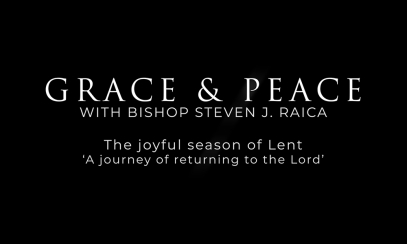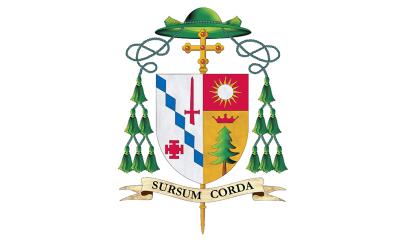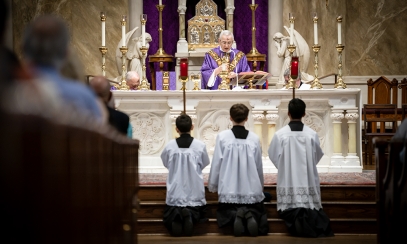
‘Love one another’
Holy Thursday celebrated at the Cathedral of St. Paul
Holy Thursday celebrated at the Cathedral of St. Paul
On March 28, Bishop Raica marked Holy Thursday at the Cathedral of St. Paul. The complete text of his homily follows herein.
On March 28, Bishop Raica marked Holy Thursday at the Cathedral of St. Paul. The complete text of his homily follows herein.
Dear sisters and brothers, tonight, we remember the Lord’s Supper during which the priesthood and the Holy Eucharist are instituted by Christ Himself. He also charged us with the mandate of fraternal charity – “love one another.” Nothing could be more important than to contemplate for a few moments the significance of these events.
It is often said, and I believe it to be true, that there can be no Eucharist without the priesthood. And, conversely, there is no priesthood without the Eucharist. Both are essential and integral to the Christian life and the spread of the Gospel. The promotion of the Eucharist would not be effective if there were no corresponding promotion of priesthood. That is to say, both are contingent on each other as we face a new world with fewer people participating in parish life in parts of the world and notably fewer priests and religious accompanying the people of God in our parishes. We can speculate as to the root causes of this worrying trend of apathy in vocation and faith commitment noting the many distractions that we face every day, among which we find consumerism, secularism, distrust of organized religion, the sins and failings of church leaders, the technological distractions that focus our attention for the length of a sound bite, and just overall apathy, to name a few. Our recent COVID lockdowns further anesthetized more people from living out their faith. It pulled some, if not many, away from the sources of living our Christian life – our relationship with Christ in the Eucharist and our relationship with each other. Parishes are, after all, more than spiritual filling stations or religious means of socialization – it is the privileged place where believers assemble to experience the presence of Jesus. Parishes are places to pray, to hear God’s Holy Word, celebrate key moments of life, to experience God’s mercy, to receive Jesus in the Eucharist, and to be charged for mission. That is to say, to integrate in and impregnate society with the spirit and values of Christ. Regrettably, some made the sad decision to leave and never return. Like Jesus, after explaining that His Body is real food and His Blood real drink – it was noted that many left His company. He turned to His Apostles and asked, “Are you going to leave Me too?” And Peter, responds for them all: “Lord, to whom shall we go? You have the words that give life.” That is our response, too. “Lord, where will we go? Who will we listen to? Only in You, have we found the words that give us life!”
This night, however, we commemorate the Lord’s Supper. We also recall the experience of the Apostles who gathered with our Lord – in person. I have to believe that it was not the first time they celebrated Passover together during their few years with Him, especially as they grew closer to Christ. However, this time it was different. The bread and the wine used in the Passover meal that night resulted in a new interpretation, a new direction, that enabled Him to institute the Eucharist, giving us the eucharistic rubrics: He took the bread, and, after He had given thanks, broke it and said, “This is My Body that is for you. Do this in remembrance of Me,” the words we use whenever we consecrate the bread into the very Body and Blood of Christ.
Similarly, the cup of wine: “This cup is the new covenant in My blood. Do this, as often as you drink it, in remembrance of Me.” The Lord’s words become a source of power and grace for each of us. During the reception of Holy Communion, we receive our Lord as a potent antidote to put the brakes on sin and death as we seek to live anew.
St. Augustine said it so well when he inferred that by taking on our flesh in the incarnation, we gave Jesus the power to die. Conversely, with Him in us, He gives us, in return, the power to live. Each had something the other did not. And together, by eating His Flesh and drinking His Blood, our very life can be transformed into eternal life – something we cannot give ourselves.
This remembrance is not bringing to mind some event in the past in a nostalgic thinking, “That was a nice thought!” No, the idea here is that what we commemorate tonight is not merely a remembrance of an historical event, but a present moment in which what happened then, is happening now, is happening today, transcending the boundaries of time and space. While there is a recounting and narration of past events, it is being lived today, here and now, by all who partake of it. God is freeing us today just as our ancestors were freed from enslavement to Pharaoh in times past. Ostensibly, there’s an essential eternal quality. We experience what it might have been like on that night when they commemorated the Passover. Similarly, we, too, can have a difficult time today comprehending everything as it truly is. Instead, we are caught up by the distractions and limitations of life, trying to figure out how to break free.
Tonight, though, let’s set the distractions aside, to bask in this moment, as we are caught up in the gift which Christ gives us, His followers: His very Body and Blood to transform us and, by extension, to transform the world, little by little, person by person, into His image and likeness.
So, the Eucharistic Revival, which we have been preparing for these past few years, (and is reaching its high point this summer in Indianapolis), is a providential moment for us, awakening us to our original baptismal promises “to keep the flame of faith burning brightly” by avoiding the sins and distractions that pull us away from the reality of Christ.
Of course, we can see what the saints say about it, especially how they relied on the Eucharistic presence as an essential factor in living holy lives. Because of their encounter with Christ, they became more themselves - they became freer individuals to the point that nothing could dissuade them from the reality of Christ.
In a similar vein, the mandatum given to us by Christ is one of charity, (i.e., a concern for the destiny of our neighbor). In a dramatic turn of events, Jesus donned an apron, washing the feet of those present. It must have felt so uncomfortable for His disciples because He reversed their pre-conceptions. We see some of the disciples protesting the gesture. With all made in the image and likeness of God, we need to contemplate the very people we are committed to serve even from different perspectives.
Tonight, as we pray, pray more intensely, placing ourselves in the garden to watch and pray with the Lord experiencing the intensity of His prayer.
We say, “Thank you, Lord, for the gift of our dedicated priests and the availability of the Holy Eucharist to nourish us, and the mission to share what Jesus is doing in our lives.”
As priests, we all say thank you to each of you for your prayers and your witness of faith, which encourages us, all the more, to be faithful. Thank you for the hope you have by sharing your dreams and aspirations as sons and daughters of God.
Let us watch and pray with our Lord and give Him our thanks and praise. May God bless you and keep you!



